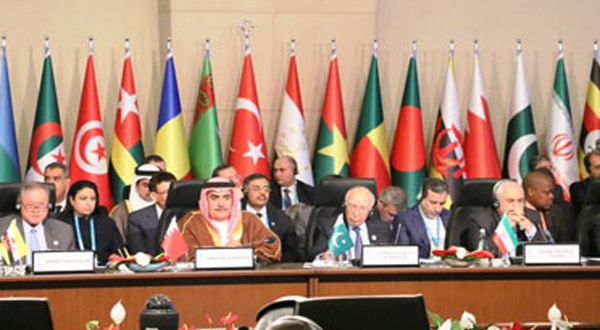ISTANBUL: Advisor to the Prime Minister on Foreign Affairs Sartaj Aziz Wednesday described the 13th OIC Summit of pivotal importance as he saw a broader role for the organization in days ahead for resolving the problems of Muslim Ummah, forging unity to confront the menace of terrorism and uplift of people through an envisaged 10-year plan of action.
The Advisor, in an interview with APP, expressed the hope that the draft joint communique agreed by the Council of Ministers of the Organization of Islamic Conference (OIC) countries would provide a road map for the member states to counter terrorism, Islamophobia and resolve their internal conflicts through better interaction.
“All members states have well realized that the issues confronting the Ummah require a broader cooperation and understanding and this Summit will have a clear roadmap for the member states to move ahead collectively,” he said mentioning to the 37-page communique that would hopefully be adopted at the Summit where the heads of state and government will be meeting on Thursday and Friday.
“If we devide this communique in three parts then the first relates to internal conflicts of the Muslim nations, Islamophobia and terrorism while the second group deals with the problems like Palestine, Kashmir, Karabakh, Syria, Yemen and other such situations. The third group of recommendations in the communique deals with promoting cultural, educational, technological and scientific cooperation among the member states,” he explained.
Sartaj said the Summit was also important in the perspective of 10 years ‘Programme of Action 2016-25’, which was a road map to enahnce the relevance of the OIC and making it more effective. “The member states have identified 18 priority areas and the Summit will lay down guiding principles for the nations to work on these items.”
In this regard, he mentioned to counter terrorism; and Islamophobia; moderation, cultural and inter-faith harmony; peace and security; environment, climate change and sustainability; poverty alleviation; trade, investment and finance; agriculture and food security; employment, infrastructure and industrialization; science and technology and innovation; health, advancement and empowerment of women and social sector; joint Islamic humanitarian action; human rights, good governance and accountability; media and public diplomacy; information, communication and digital infrastructure; and OIC institutional reforms.
“This ten years programme of action will enhance Islamic solidarity and partnership, achieving targets and implementation of decisions through a collective approach. It will make the OIC more relevant in coming years,” he added.
Answering a question, Sartaj Aziz said at the working group level the issue of Kashmir was discussed in detail and the representative of the OIC Secretary General stated in clear terms that struggles like
Kashmir and Palestine could not be linked to terrorism by any means as he also stressed that the Kashmir issue must be resolved now.
The importance of the this working group could also be understood by this gesture that the Turkish Foreign Minister left the plenary meeting midway to join the working group meeting, he said, adding that all the member countries of this group urged the international community and India to fulfil their obligation to give Kashmir their just right to self-determination.
Speaking about the overall deliberations during the meeting of the Council of Ministers, the Advisor said since the Muslim world was facing a number of problems, the feeling of collective approach was getting stronger among the member states. “This feeling will enhance the importance of OIC within the member countries as well as among other nations.”
About Pakistan, he said the country had an important role to play at the OIC platform in coming years. “We are (an) active member of the OIC. We alone are one-sixth of this 57-member organization. So other members see us with respect for our integrity and standing.”
He said the member states were also seeing towards Pakistan to learn from its struggle against terrorism. “The way we have dealt with the issue of terrorism is appreciated by member states. They want to learn from us becauzse we have curtailed terrorism at a time when it was on rise in other countries.”
Finally, he expressed the hope that the member countries would better understand the problems by exchanging views and come up with a clear thinking that only collectively they can fight out the challenges confronting the Muslim countries.





